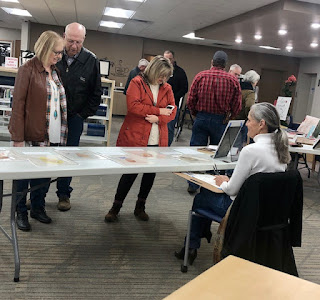 |
| From The Pratt Tribune |
The same week I began this series about the role of muckrakers and the important role they have played in print news, our local newspaper announced that it was going to a single paper each week. I identified with J.S. who wrote: "Wow, quite a change...when I worked there... we printed Monday-Saturday…"
I grew up with our family getting The Pratt Tribune, (and some of you may recall my blog about finding an old copy of that newspaper inside the wall when we did our recent remodeling at the farm). Back then, when we walked out to the mailbox, the news was only a day old.
The same week that my Battling Abuses series began, the CBS Sunday Morning show broadcast a special interview of Pete Hamill that included respect for his fellow reporter, Jimmy Breslin. Breslin died in 2017, and Hamill has slowed down considerably from the days when the two of them were, as filmmaker Spike Lee described: "Back in the day, I mean, you would buy the paper to see what Jimmy Breslin's saying. You know, what Pete Hamill [says]…[T]hose guys were like superstars."
I have written in past blogs about the essential role of journalists for our democracy, and we cannot forget their importance. Our Founding Fathers recognized the importance of a Free Press, but too many of us fail to respect the absolute necessity of the role played by the press.
 |
| Ad from a local business in Isaac's time |
On the CBS Sunday Morning show October 6, 2019, Hamill explained: "The papers gave a sense of meaning. It was a binding element. You could see it on the subway. You [reporters] were trying to help the new arrivals to understand the city, and the older people to understand the new arrivals." Small town newspapers play that role as well, but not if most of the contents are canned stories written by strangers.
After my father died and my mother moved into town, she became a reporter. She loved it. Being a reporter gave her an excuse to attend community events and to get on the phone and call people for news about visitors or trips or achievements. It may have been small town news, but it was consistent with the role Hamill played in a big city--binding the people who lived there to one another.
Times change. The number of shops that lined Main Street in small towns and cities are no longer there, so far fewer local ads that supported local papers now exist. Today people are warned to protect personal information, making them less willing to supply the stories that would once have appeared in the newspaper. The internet has replaced chatty phone calls and handwritten letters, and now it is replacing small town newspapers. Even large city newspapers are struggling.
Once there were both morning and evening editions for newspapers, but today we want our news as quickly as it happens. "Hot off the press!" isn't fast enough, nor is Uncle Walter* on the evening news. Now we have televisions and the internet with constant news reports, crawls across the bottom of the screen, and news fed to our phones.
 |
| Political Cartoon about a biased press |
In earlier blogs I have emphasized the importance of professional standards for the news reporters we read and to whom we listen and watch. For me, biased news is like reading fiction, or, at its worst, propaganda. If we are to keep news reporters accurate, we need to take the time to find the original source at least occasionally to check it for ourselves.
We also need to stop watching/reading only those with whom we agree, especially if we catch them twisting the truth. Like the old saying when computers were new, junk in--junk out. I realize that it is easier for some of us to fact check than for those employed 8+ hours a day, those busy raising children and caring for elderly parents, or those otherwise involved in commitments that fill their days, but it is important that all of us to try to be accurately informed. We need to be clear about the difference between those delivering Opinion Editorials, those intentionally slanting or distorting information, and those abiding by professional standards for the delivery of news.
I will close with what I found most interesting in the interview of Pete Hamill. He was asked, "Would you say you grew up poor?"
"Oh, we grew up poor, but not impoverished," Hamill said.
What's the difference, the interviewer asked.
"The library."
Hamill continued, "I wouldn't be alive today if it wasn't for the lessons I learned in this place. [the public library]" Later, Hamill added an enlightening story about fellow reporter Jimmy Breslin. "One day he needed to find something in his desk. And he asked me to go to his desk, 'open the drawer and it'll be on the right-hand side.' Lying in front of me is The Collected Poetry of W.H. Auden." Being literate was part of being an educated person in those times, even if you were a hard-nosed reporter like Breslin.
 |
| Recognize propaganda (from my old text book) |
With our present day 'need for speed,' and consumer ratings, not only are newspapers dying, so is the habit of reading. Authors and poets have time...time to reflect, to compose, to edit, to lay their work aside and look at it with fresh more critical eyes later, to seek the opinions of respected friends and others knowledgeable about the subject...time to perfect what they publish. Even as newspaper reporters facing quick deadlines, Breslin and Hamill knew that it was important to make time for books and poetry. It remains true today that to be informed and literate, our reading needs to be supplemented by more than the "breaking news" that scrolls across the bottom of our screen. Magazines are struggling to find readers, and it is important to have access to their more reflective news that gets at least a few days or weeks of research and investigation before it is published. Before print magazines go the way of newspapers, we need to subscribe to the ones we respect for more in depth news reporting.
 |
| Recognize propaganda (from my old textbook) |
The responsibility to be reflective rests with all of us-- to read history, to check the constitution, to read biographies and non-fiction related to the subject, to see what another channel on tv or commentator on the internet or newspaper reporter with more time to check facts has to say. To be fooled requires two people--the one who seeks to fool and the one who falls for it!
The 'Abuses in the 1800s' that Isaac and his contemporaries faced were not entirely unlike our own examples. Today's abuses may come at us faster and from more directions, but we also have more access to ways to check what is accurate. We need muckrakers today as much or more than ever.
*For younger readers of the blog, Walter Cronkite delivered the evening news for CBS, and had a reputation for accurate reporting.
Remember, you can click on images to enlarge.



































